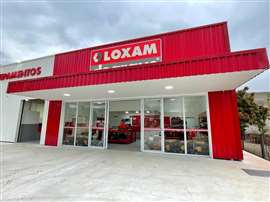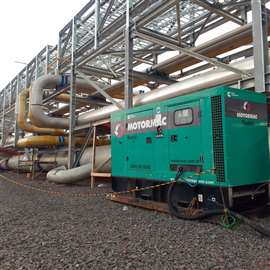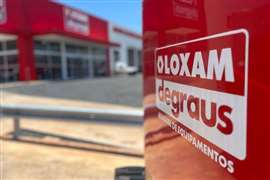Interview: Loxam Brazil CEO on rental market growth
07 May 2024
 Loxam entered Brazil in 2015, and has since complated a number of acquisitions in the country. (Photo: Loxam Brazil)
Loxam entered Brazil in 2015, and has since complated a number of acquisitions in the country. (Photo: Loxam Brazil)
European rental giant Loxam first entered the Brazilian rental market in 2015 with the purchase of Degraus Andaimes, a company with which it had held a 25% share of before becoming the controlling entity in 2018.
Since then, the company has solidified its presence in the country with the acquisitions of Motormac Rental and A Geradora, expanding its geographic coverage to the south and northeast of Brazil.
Speaking to IRN earlier this year, Guilherme Boog, CEO of Loxam in Brazil discussed the current landscape of rental in the country, how Loxam is dealing with the energy transition and similarities with Loxam in Europe.
How would you describe the current state of the rental market in Brazil?
The rental market is going through a consolidation process, grouping medium-size companies under the umbrella of big corporations. This trend is ongoing in yellow line equipment and generalist rental companies, and there is still much room for consolidation.
This process is positive because this raises the bar in quality offer and allows a de-centralization, allowing large companies to get to more distant areas.
Brazil is a large country, that alone is equivalent to 85% of the geographical area of Europe, and it might be difficult for small companies to reach the most remote areas. With a big company behind us, able to exchange equipment depending on local spot demands, it might be easier and quicker to establish a rental culture at such locations.
What are the main challenges and opportunities for the market?
 Guilherme Boog, CEO of Loxam Brazil. (Photo: Loxam)
Guilherme Boog, CEO of Loxam Brazil. (Photo: Loxam)
The return of the large infrastructure projects that were on hold since 2016 due to the economic crisis. These projects may bring further investments in Oil & Gas, Mining, Waste & Water, Trains & Metros, highways, power plants, ports and airports.
The risks are associated to infrastructure gaps that might jeopardize the economic growth due to lack of power, water issues, low capacity/productivity in ports and airports, etc.
Are you noting growth in demand for rental in Brazil? If so, what is driving that demand?
Yes, we are still in a period of recovery from the big crises we have lived from 2014 to 2018. In the middle of the recovery, we faced another crisis, the Covid crisis, that affected all the world and obviously the construction market in Brazil was also influenced.
Therefore, having a perspective of infrastructure investments after so many years is a great news for the whole construction market in Brazil.
As many construction companies were affected during the crisis, the ramp-up of the new investments will be surely done with rented machines, and all the companies are getting prepared for this favourable moment.
Is your focus on being a generalist or are you looking at specific sectors like aerials, power, etc?
Currently, considering the three companies in Brazil, we are leaders in generators and compressors rental, and we are number three as a general rental company in Brazil.
Aerial work platforms are a very important product for Loxam Degraus and Loxam Motormac Rental, and our strategy is to remain generalist in Degraus and Motormac and specialist in power at A Geradora.
Currently Motormac Rental has 4 products under their offering portfolio, but this might be changed in a few years.
Do you operate in the same way that Loxam does in Europe, or are there significant differences to the way you work?
We follow basically the same guidelines, with a strong focus on the quality of the offered machine. Being a large country, we have a high geographical dispersion and competitors are spread, usually with only one agency in specific locations.
Due to low competition at these locations, usually the quality of the offer might be far from the customers’ desire, therefore the quality of the available machines is still a differential offering in Brazil. Under this scenario, we are still years away from requests like environmental-friendly machines.
Are you using the same equipment suppliers as Loxam in Europe, or do you have a separate purchasing policy?
 Boog says aerial work platforms remain an a important product for Loxam Degraus and Loxam Motormac Rental. (Photo: Loxam Brazil)
Boog says aerial work platforms remain an a important product for Loxam Degraus and Loxam Motormac Rental. (Photo: Loxam Brazil)
We have autonomy to purchase equipment that are requested by our customers, according to the availability at the local market. For Generators, all the fleet is manufactured in Brazil due to the specific electrical ratings.
For other products, most of them are imported, like platforms, and parts can be manufactured or assembled locally.
To what extent are you able to use used machines from Loxam’s European or Middle east fleets?
Brazil is not a traditional market for used machines and I say this for two reasons: 1) the difficulty of import/export processes for used machines (customs barriers); 2) availability of spare parts: due to the difficult in the import/export process, it is also very challenging to the parts even for new machines, therefore for old machines it can be almost impossible.
For this reason, it is very seldom to see batches of used machines being imported – nevertheless, very common to listen to problems related to imported used machines.
On the energy transition, are contractors interested in low carbon equipment and are they willing to pay for such equipment?
Very few customers have a true request and interest in green solutions. Most of the customers are just looking for a cost-effective solution, ignoring other aspects like emissions or corporate responsibility.
Most of the time, I’m sorry to say than not even the fuel consumption is challenged during a decision process. Of course, there are customers with specific and demanding requirements, but these are exceptions in our market.
 The fleet of Loxam generators are all manufactured in Brazil. (Photo: Loxam Brazil)
The fleet of Loxam generators are all manufactured in Brazil. (Photo: Loxam Brazil)
I see that we are going in this direction, however it will take a few years to get to the awareness level that I see today in more developed markets.
As market leaders, Loxam is pushing new product lines “LoxGreen” with no emission during the product use, and this trend is being followed by other large rental companies. We expect that this attitude may change the market picture in medium term.
In Europe there are concerns about the charging infrastructure for battery powered machines. Is it the same in Brazil?
Brazil has some infrastructure gaps and sometimes we have power shortages in different regions across the country.
Usually the problems relate to power availability come from increasing economic activity, because the generation and transmission capacity is usually close to the maximum availability.
Having that said, the power availability issues are much more related to a season of favourable economic growth than to a process of fleet decarbonization, which today is not a relevant issue yet.
|
STAY CONNECTED



Receive the information you need when you need it through our world-leading magazines, newsletters and daily briefings.
CONNECT WITH THE TEAM








